

Solon Community School District - District - Academics - Standards-Based Grading/Reporting. Standards-Based Grading The Solon Board of Education approved new grading guidelines at its May 2012 meeting.
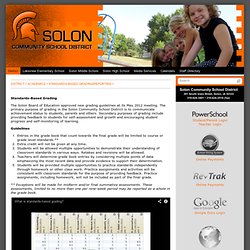
The primary purpose of grading in the Solon Community School District is to communicate achievement status to students, parents and others. Secondary purposes of grading include providing feedback to students for self-assessment and growth and encouraging student progress and self-monitoring of learning. Guidelines Entries in the grade book that count towards the final grade will be limited to course or grade level standards. Redesigned SAT - College Board - Changes to the SAT Spring 2016. When students open their SAT test books in spring 2016, they’ll encounter an SAT that is more focused and useful than ever before.
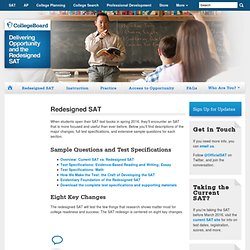
Below you’ll find descriptions of the major changes, full test specifications, and extensive sample questions for each section. Sample Questions and Test Specifications Eight Key Changes The redesigned SAT will test the few things that research shows matter most for college readiness and success. The SAT redesign is centered on eight key changes. Relevant Words in Context The redesigned SAT will focus on relevant words, the meanings of which depend on how they’re used. Requiring students to master relevant vocabulary will change the way they prepare for the exam. Read more about relevant words in context, and view a sample question.
Command of Evidence Questions in the SAT Writing and Language Test will also focus on command of evidence. The Essay will also require students to demonstrate command of evidence. Essay Analyzing a Source. Explaining test results to parents. Eissenberg, Thomas E. & Rudner, Lawrence M. Eissenberg, Thomas E.
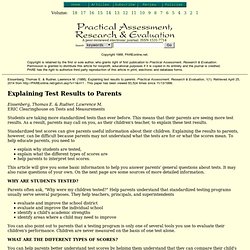
& Rudner, Lawrence M. ERIC Clearinghouse on Tests and Measurements Students are taking more standardized tests than ever before. This means that their parents are seeing more test results. As a result, parents may call on you, as their children's teacher, to explain these test results. Standardized test scores can give parents useful information about their children. Explain why students are tested, explain what the different types of scores are help parents to interpret test scores. This article will give you some basic information to help you answer parents' general questions about tests. Parents often ask, "Why were my children tested? " evaluate and improve the school district evaluate and improve the individual school identify a child's academic strengths identify areas where a child may need to improve. Assessment in Math and Science: What's the Point? What Are Some Types of Assessment? In the early theories of learning, it was believed that complex higher-order thinking skills were acquired in small pieces, breaking down learning into a series of prerequisite skills.
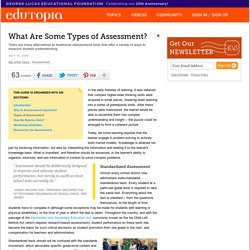
After these pieces were memorized, the learner would be able to assemble them into complex understanding and insight -- the puzzle could be arranged to form a coherent picture. Today, we know learning requires that the learner engage in problem-solving to actively build mental models. Knowledge is attained not just by receiving information, but also by interpreting the information and relating it to the learner's knowledge base. What is important, and therefore should be assessed, is the learner's ability to organize, structure, and use information in context to solve complex problems. NAEP Nations Report Card - National Assessment of Educational Progress - NAEP. Formative Assessments Are Easier Than You Think!
When I was teaching science one of the best lessons I learned was about formative assessment.
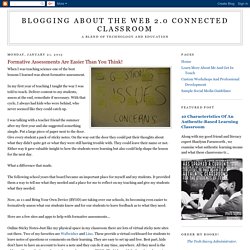
In my first year of teaching I taught the way I was told to teach. Deliver content to my students, assess at the end, remediate if necessary. With that cycle, I always had kids who were behind, who never seemed like they could catch up. I was talking with a teacher friend the summer after my first year and she suggested something simple. Put a large piece of paper next to the door. What a difference that made. The following school years that board became an important place for myself and my students. Now, as 1:1 and Bring Your Own Device (BYOD) are taking over our schools, its becoming even easier to formatively assess what our students know and for our students to leave feedback as to what they need.
Here are a few sites and apps to help with formative assessments... Online Sticky Notes-Just like my physical space in my classroom there are lots of virtual sticky note sites out there. 40 Alternative Assessments for Learning. When people think of assessment, pencils and bubble sheets may be the first things that come to mind.
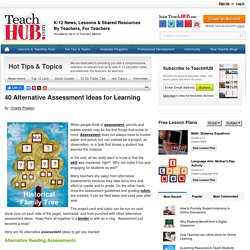
Assessment does not always have to involve paper and pencil, but can instead be a project, an observation, or a task that shows a student has learned the material. In the end, all we really want to know is that the skill was mastered, right? Why not make it fun and engaging for students as well? Many teachers shy away from alternative assessments because they take extra time and effort to create and to grade. On the other hand, once the assessment guidelines and grading rubric are created, it can be filed away and used year after year. The project card and rubric can be run on card stock (one on each side of the page), laminated, and hole punched with other alternative assessment ideas.